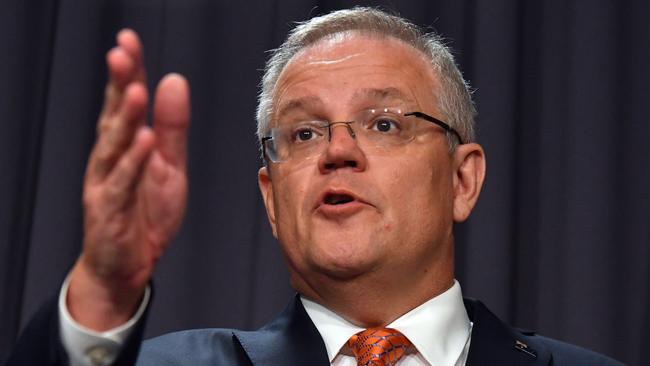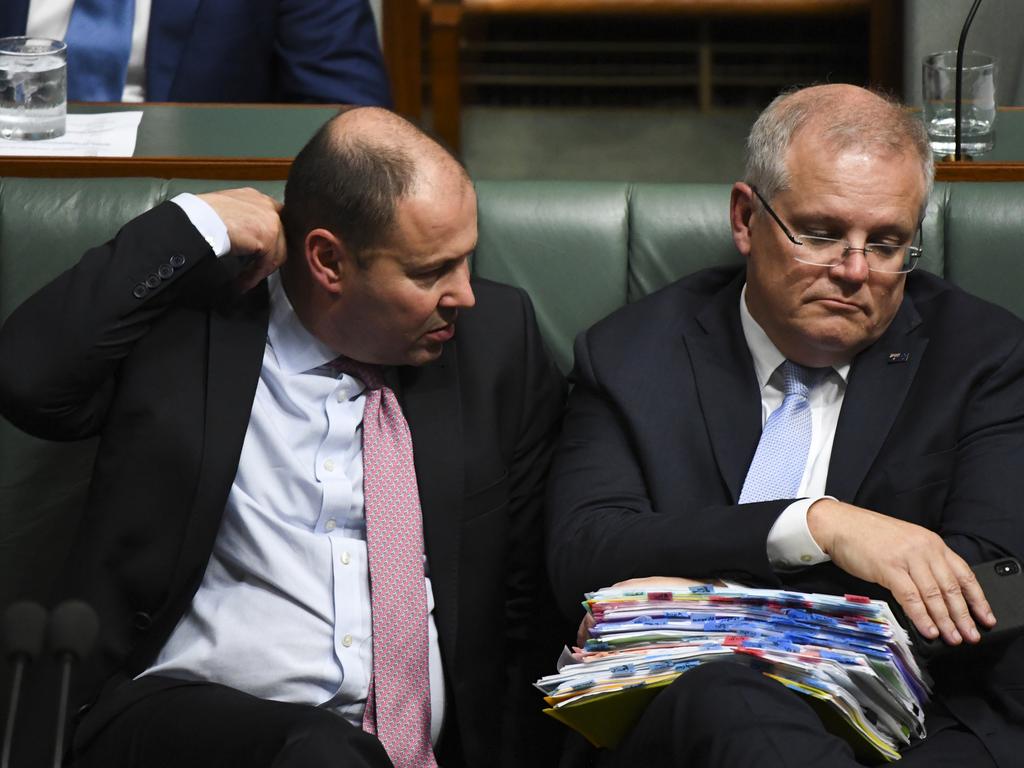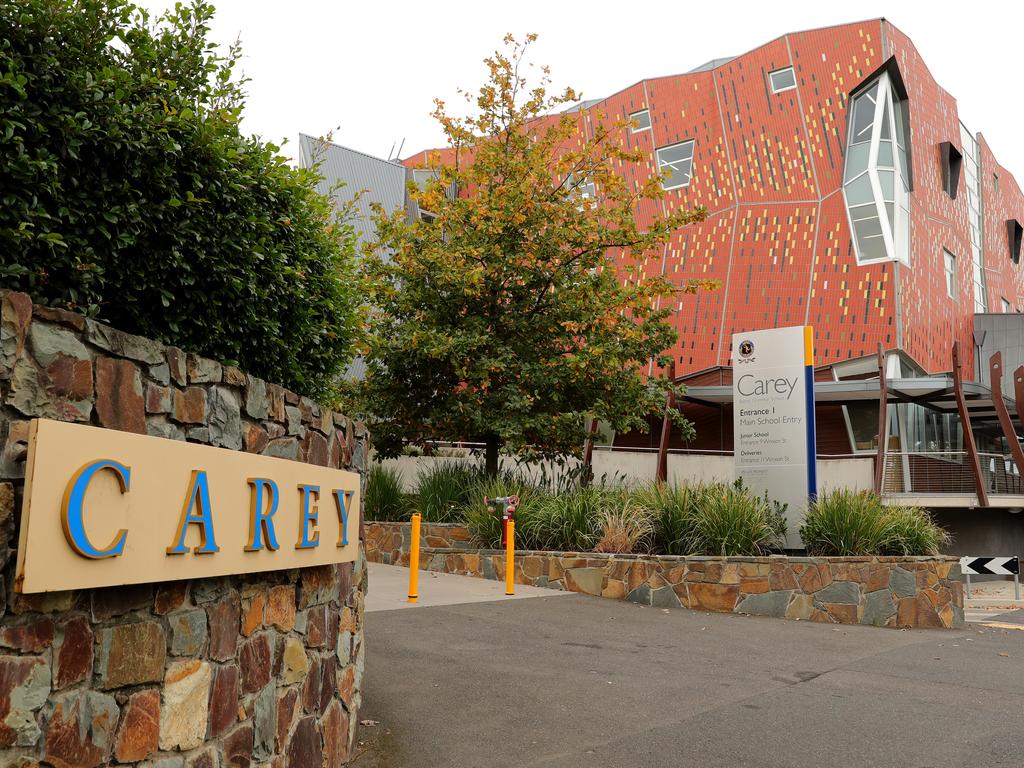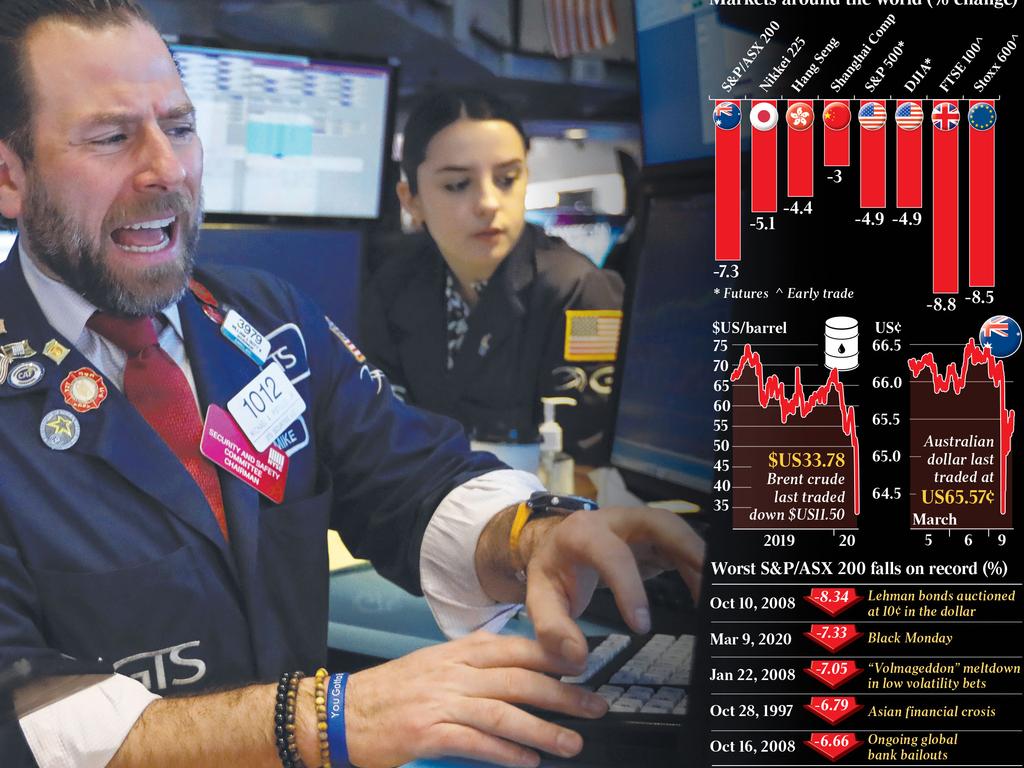Surplus lost in $10bn coronavirus rescue operation
PM jettisons budget surplus to fund a coronavirus stimulus package in a bid to stave off a recession.

Scott Morrison has jettisoned the budget surplus to fund a coronavirus stimulus package of almost $10bn in a bid to stave off a recession.
Treasurer Josh Frydenberg conceded in meetings last week the forecast $5bn surplus this financial year would need to be sacrificed for a “substantial” fiscal package to inject short-term cash into the economy, The Australian has learned.
The state and territory governments are also under pressure to adopt their own plans, with estimates that a short-term payroll tax amnesty could inject an immediate $9bn of job-saving cashflow into affected businesses.
A final federal stimulus package has yet to be settled on, with the government’s razor gang expected to present a plan to cabinet on Tuesday. However, sources have said the numbers were yet to be finalised and a decision on short-term assistance was unlikely to be settled before Wednesday.
The Prime Minister is understood to be taking daily briefings from Treasury and relevant cabinet ministers, but is yet to be satisfied with the package. The urgency of the measures was underlined on Sunday as the Italian government took the drastic step of quarantining the northern region of Lombardy, home to 10 million people, after more than 5800 cases of the virus were confirmed — 233 of them fatal.
Prominent businessman Tony Shepherd said tax relief and investment incentives should be on the table “for all businesses”, along with a pause in new red tape. “As it is, private investment was at a long-term low before the crises hit,” he said.
“A holiday from new business regulation at all levels of government would inspire confidence. A wind back would be nirvana.”
He said tax relief would be “essential” for those on lower incomes. “Perhaps they could have a holiday from compulsory superannuation, giving them a well-needed 9 per cent pay hike at zero cost to the budget,’’ he said.
Mr Shepherd, who conducted a commission of audit into federal finances for the Abbott government, also said regional assistance should be focused on bushfire and drought relief.
Investors are bracing for another volatile session on the sharemarket, with futures pointing to heavy falls on Monday.
Australian shares are priced to drop 1.5 per cent, or 93 points, at the open after data showed China’s exports collapsed in the first two months of the year.
A plunge in oil prices will add to the selling pressure and negative sentiment. Brent crude, the global benchmark, on Friday fell more than 9 per cent to $US45.27 a barrel, in what was its biggest one-day drop since 2008.
Attorney-General Christian Porter will meet union and employer groups on Tuesday to discuss work health and safety practices and employment arrangements for workplaces hit by coronavirus cases. Industry Minister Karen Andrews has also invited business groups, manufacturers and others to a roundtable meeting on Wednesday.
Despite runs in recent days on toilet paper and staple foods, Ms Andrews said panic buying was unnecessary. “Many of our food manufacturers for example have an inventory of four-weeks plus … and have increased the level of their manufacturing over the last week in particular,” she said.
Mr Hunt said new telehealth services would be ready by the end of the week, to help minimise exposure of GPs and other patients to coronavirus sufferers.
Amid growing fears over the economic impact of the crisis, business groups urged a rapid and substantial support package, including the fast-tracking of $2bn in bushfire response spending.
“That cash needs to get into the hands of people who will spend it because they need it — so there’s an instant stimulus,” Australian Chamber of Commerce and Industry chief executive James Pearson said. Mr Pearson also called for an expansion of the instant asset write-off scheme as a “tried and true” measure to get companies to bring forward spending, and said the government should be prepared to bring forward already-legislated small business and personal tax cuts.
Council of Small Business Organisations Australia chief executive Peter Strong called for cash grants for employers to retain apprentices and manage their cashflow, and said workers forced to stay at home should be given training vouchers for to help them make the most of their time off.
Labor said an “urgent” boost to business investment write-offs should be a key element of the package. “It’s not just a matter of how big it is, it’s how it’s designed. And the better designed it is, the better bang for buck,” opposition health spokesman Chris Bowen said.
He said casual workers affected by the crisis should also get rapid access to Newstart payments, while a boost to the unemployment safety net would be a welcome stimulus measure.
But Social Services Minister Anne Ruston said “any long-term structural changes” to welfare would be “a separate conversation”.
Fears the coronavirus will drive a global economic downturn were further amplified over the weekend after Moody’s Investors Service warned the health emergency could trigger a string of recessions across the developed world, with the US, Japan, Germany, Italy, France, Britain and South Korea all facing two quarters of negative growth.
Moody’s said its initial forecasts of the economic damage had been focused on the impact on Chinese activity and disruptions to global travel and supply chains.
But in the event of an “extensive and prolonged slump”, GDP growth among advanced economies would slow to 0.5 per cent this year, and to 1.3 per cent in Australia, Moody’s said.
Last week Standard & Poor’s Global Ratings slashed its Australian growth estimate to 1.2 per cent, a pace that meant the country would “almost certainly” experience two consecutive quarters of negative growth for the first time in nearly three decades.
ADDITIONAL REPORTING: Richard Ferguson, Glenda Korporaal







To join the conversation, please log in. Don't have an account? Register
Join the conversation, you are commenting as Logout